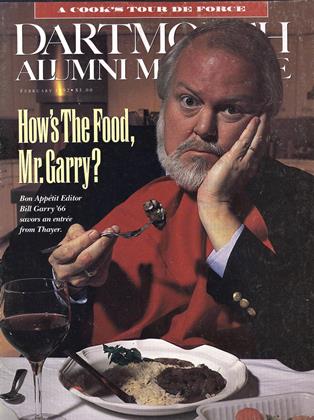"I refuse to accept the conventional wisdom of this time and place."
Of all the dartmouth faculty, English Professor Jeffrey Hart '51 probably needs the least introduction. Even if you never took his classes on Boswell, Johnson, Burke, or Swift, you've probably met him in at least one of his other incarnations: as a syndicated conservative columnist, as a senior editor of National Review, as a former speechwriter for Richard Nixon and Ronald Reagan, as the author of seven books, or as a defender of The Dartmouth Review.
Obviously Hart is not afraid to speak out, even when his polemics cause an on-campus backfire. Many of his faculty peers bristle over the style and the substance of his remarks, as when he argued for the return of the Indian symbol, questioned the stability of former music professor William Cole, or called President Freedman a liar. Clearly, Hart doesn't try to mince words or ideas. "Outside academia people think of me as a moderate. I'm eclectically conservative—like the temper of the nation and the world," he says. "At Dartmouth I'm considered extremely, bafflingly, right-wing. I don't care. It's more'a reflection of Dartmouth than of me." He states feistily, "I refuse to accept the conventional wisdom of this time and place."
Hart has a history of rejecting Dartmouth's conventional wisdom. He transferred to Columbia after his sophomore year in 1949 rather than keep on with what he considered a mediocre program in English. "I was probably more literary than other students," he says simply. He probably was: During summer work at Simon & Schuster he attracted the attention of critic and professor Lionel Trilling, who urged him to pursue literature at Columbia. Hart later taught English and Humanities there while working toward his doctorate. Teaching such authors as Gibbon and Burke, he had what he calls an "aesthetic epiphany. They had a confidence in a tradition that strongly appealed to me. They knew what was civilization and what was barbarism."
While assiduously separating partisan polities from his English lectures, he urges students to study the "paradigm of Western culture:" "You carl get a responsible liberal arts education at Dartmouth," he told some 50 students at the start of fall term as he outlined a Western Civ curriculum to show them how. "You have to know what your culture is—how it happened and where." Then, says Hart, you can go study whatever else you like.
 View Full Issue
View Full Issue
More From This Issue
-
 Feature
FeatureHitting His Stride
February 1992 By Charles Wheelan ’88 -
 Feature
FeatureThe Gentleman's B-Plus
February 1992 By Eric Konigsberg '91 -
 Feature
FeatureEat Here
February 1992 By CHRIS WALKER '92 and TIG TILLINGHAST '93 -
 Feature
FeatureThe Geriatric Adventure Society
February 1992 By Will Lange -
 Article
ArticleA Nation of Gentlemen
February 1992 By Professor Jeffrey Hart -
 Article
ArticleDr. Wheelock's Journal
February 1992 By "E. Wheelock"
Karen Endicott
-
 Article
ArticleIran's Bum Rap
February 1993 By Karen Endicott -
 Article
ArticleGaudeamus Igitur!
September 1993 By karen Endicott -
 Article
ArticleFilling The Power Vacuum
June 1994 By Karen Endicott -
 Article
ArticleSlesnick by the Numbers
SEPTEMBER 1994 By Karen Endicott -
 Article
ArticleSpace Politics
March 1996 By Karen Endicott -
 CLASSROOM
CLASSROOMThe Answers Are Blowin’ in the Wind
Jan/Feb 2001 By Karen Endicott
Article
-
 Article
ArticlePLAYERS VISIT WORCESTER AND NORTHAMPTON
June, 1922 -
 Article
ArticleAn Interesting Choate Letter
MARCH 1930 By Herbert D. Foster -
 Article
ArticleEmerson's Historic Visit
January 1939 By Herbert Faulkner West '22 -
 Article
ArticleBetween Seasons
April 1977 By JACK DEGANGE -
 Article
ArticleArts Catalyst
MARCH 1973 By MARY ROSS -
 Article
ArticleMore About Lon
December 1934 By The Editors

